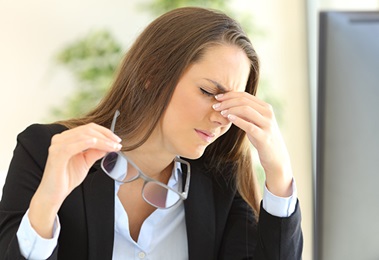4 Signs You Might Have Sleep Apnea
Obstructive sleep apnea is a common disorder that causes the airways to collapse or become blocked while you’re asleep. It can cause you to stop breathing for 20 to 30 seconds at a time, numerous times throughout the night.
Untreated apnea can increase the risk of a number of diseases, including high blood pressure, heart disease, stroke, diabetes and some headache syndromes. Yet many people with sleep apnea don’t know they have it.
Could you be one of them? Watch out for these warning signs.
1. You’re a Noisy Sleeper
Snoring, snorting or gasping: Noisy sleep is a warning sign that your upper
airway might be obstructed. Not all snorers have apnea, but the two often
go hand-in-hand. As snoring gets louder, chances of having
sleep apnea are greater and greater.
If you have apnea, your bed partner might notice that the snores are
punctuated by pauses in breathing. Those are apnea episodes, and they can
recur hundreds of times a night.
2. You’re Restless During Sleep
People with apnea often toss and turn and otherwise show signs of restless nighttime sleep. If you find yourself kicking, thrashing, jerking or waking up under a twisted pile of disheveled sheets, apnea might be a possible cause. When you’re struggling to breathe at night, your sleep becomes disrupted.
What Could It Be?
Sleep apnea is hardly the only issue that interferes with sleep. Experts have described more than 70 different sleep disorders. Other common culprits include:
- Restless legs syndrome: RLS causes unpleasant sensations in the legs and an urge to move them for relief.
- Narcolepsy: This disorder causes people to fall asleep suddenly during the day for periods of a few seconds to a number of minutes. It occurs regardless of how much sleep a person gets at night.
- Insomnia: Some 60 million Americans regularly have trouble falling or staying asleep, for a variety of reasons.
If you're having trouble sleeping, you should learn when to talk to your doctor .
3. You’re Always Tired
If you’re getting a full night of sleep but still feel tired all day, apnea might be affecting the quality of your sleep. You might nod off when reading or in front of the TV. You might be more irritable, less productive and make more mistakes at work. You might even find yourself catching more colds, since poor quality sleep can interfere with the immune system. There are all kinds of spillovers from bad quality sleep into daytime activities.
4. You Fit the Profile
Some people are at greater risk of obstructive sleep apnea. Men are more likely to have apnea than women, though the risk for women increases after menopause. And being overweight or obese increases apnea risk markedly.
If you recognize any of these warning signs, talk to your doctor. He or she will probably recommend a sleep study. Sleep studies are done overnight in a specialized lab or, sometimes, in your own home. The sleep study is a way to characterize the breathing patterns while you’re asleep.






